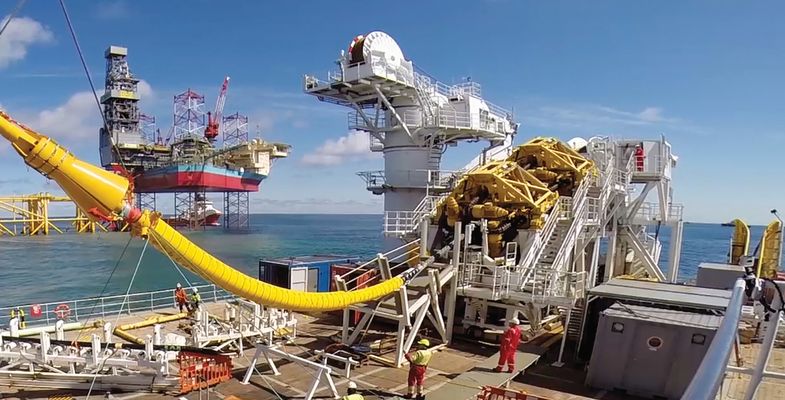Offshore Platform & Subsea Cable Testing
The testing of offshore platforms and subsea cables is crucial in ensuring the safety, reliability, and longevity of these critical infrastructure components. Offshore platforms are essential for the extraction of oil, gas, and other resources from beneath the sea floor, while subsea cables provide power transmission across vast distances under water.
Our laboratory offers comprehensive testing services tailored specifically to the unique requirements of offshore platform and subsea cable installations. These tests ensure that all materials comply with relevant international standards such as ISO 14965-2 and EN 50382, which specify test methods for submarine power cables.
Our team of experts uses advanced equipment including multi-axis fatigue testers, high-pressure simulators, and specialized environmental chambers to simulate real-world conditions that these components will encounter. This includes exposure to saltwater corrosion, extreme temperature ranges, pressure variations, and mechanical stresses.
For offshore platforms, we conduct detailed structural integrity assessments using non-destructive testing techniques like ultrasonic flaw detection (UT) and radiographic examination (RT). We also perform hydrostatic testing under controlled conditions to simulate the pressures they will face during operation. For subsea cables, our tests cover insulation resistance measurement, voltage endurance tests, and flexural fatigue studies.
The results of these rigorous tests are essential for compliance with regulatory requirements set forth by bodies such as the International Maritime Organization (IMO) and Underwriters Laboratories (UL). Compliance is not just about legal adherence; it ensures that all materials used in offshore operations meet stringent quality standards necessary for safe performance under harsh marine environments.
Our services extend beyond basic testing to include full lifecycle support from initial design reviews through final decommissioning. By integrating our testing capabilities early into the development process, we help manufacturers optimize their designs for both performance and cost-effectiveness.
A successful offshore project requires not only robust equipment but also thorough understanding of marine conditions which can vary greatly depending on location. Our experienced technicians possess deep knowledge about various geographical regions where projects are likely to be implemented allowing us to tailor our approach accordingly.
Industry Applications
The testing services we provide have wide-ranging applications across multiple sectors including oil & gas, renewable energy, maritime transport, and infrastructure development. In the oil & gas industry, offshore platforms play a vital role in extracting hydrocarbons from beneath the sea floor.
- Structural Integrity Testing: Ensures that platforms can withstand harsh weather conditions such as hurricanes or typhoons without sustaining damage.
- Material Durability Assessment: Evaluates how well materials used in construction stand up against saltwater corrosion and UV radiation over extended periods.
In the renewable energy sector, wind turbines mounted on floating structures require similar types of evaluations to ensure they can operate efficiently even when seas are rough. Similarly, solar farms located offshore need robust foundations capable of withstanding severe storms.
- Electrical Safety Checks: Verify that electrical systems aboard platforms and ships adhere strictly to safety regulations preventing accidents due to faulty connections or insulation breakdowns.
- Performance Optimization Recommendations: Based on test findings, we suggest modifications aimed at improving efficiency without compromising safety standards.
For maritime transport companies, it is essential to ensure that vessels meet strict certification requirements before being allowed to sail. Our tests help verify compliance with these standards ensuring safe passage for both crew and cargo.
Customer Impact and Satisfaction
- Enhanced Safety: By identifying potential weaknesses early, our testing helps prevent catastrophic failures leading to loss of life or significant financial losses.
- Improved Efficiency: Optimized designs resulting from our recommendations reduce operational costs while maintaining high levels of functionality.
- Regulatory Compliance: Meeting all necessary regulatory requirements first time around saves valuable time and resources compared to non-compliance penalties later down the line.
We strive to deliver exceptional service by providing accurate, timely reports that are easy for clients to understand. Our friendly staff members take pride in ensuring every customer feels supported throughout their testing journey—from initial consultation through final analysis.
Environmental and Sustainability Contributions
- Reduced Waste: Through careful planning of our tests, we minimize the amount of waste generated during the testing process. This aligns with global efforts to reduce environmental impact.
- Better Resource Management: Our expertise in optimizing designs helps clients make better use of available resources thus reducing overall consumption rates.
Incorporating sustainable practices into our operations further enhances our commitment towards protecting the environment. For example, we utilize energy-efficient lighting systems and recycling programs within our facilities to reduce our carbon footprint.





